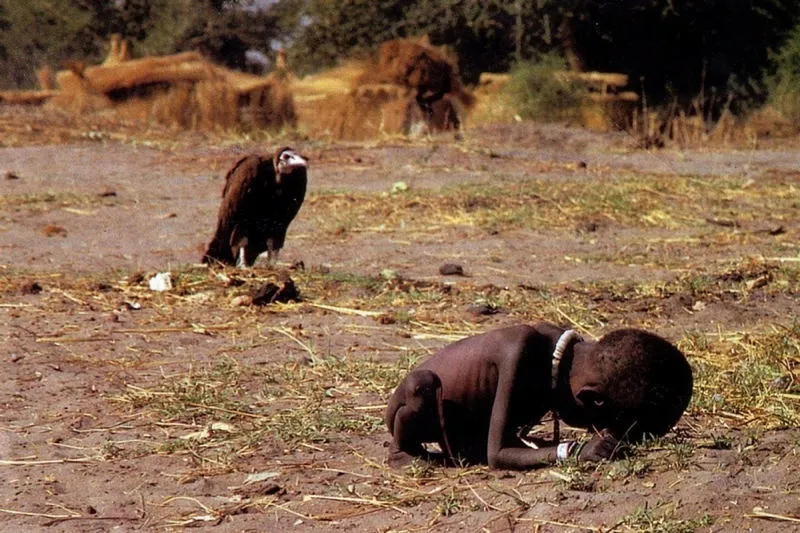Estimated Reading Time: 3 min
The photograph of a Sudanese child being stalked by a vulture is one of the most haunting and controversial images in photojournalism. It was captured in March 1993 by Kevin Carter, a South African photojournalist. Here is the background and story behind this iconic yet deeply unsettling image:
In March 1994, the photo won the Pulitzer Prize for feature photography. Two months after receiving the prize Carter took his own life.
The Context of the Photograph
Kevin Carter traveled to Sudan during a famine to document the devastating effects of starvation and civil conflict. The photograph shows a severely malnourished child, collapsed on the ground, struggling to reach a feeding center. In the background, a vulture is ominously perched, appearing to wait for the child to die. The stark imagery of human suffering juxtaposed with the predatory bird became a chilling symbol of the broader humanitarian crisis.
The Public Reaction
The photo was published in The New York Times on March 26, 1993, and sparked a massive international outcry. It brought global attention to the Sudanese famine but also provoked intense debate about ethics in photojournalism. Many questioned Carter’s role and decisions as a photographer. Critics accused him of being a passive observer of suffering rather than helping the child.

Carter’s Defense and Emotional Struggles
Carter explained that he had been instructed by aid workers not to touch famine victims to prevent the spread of disease. He had waited 20 minutes for the vulture to fly away before taking the photograph. After capturing the image, Carter reportedly chased the bird away, but the lingering question of what happened to the child haunted him.
Carter himself later expressed deep regret and emotional turmoil over the scene and the criticism he faced. The image, though impactful, became a source of psychological anguish for him.
Awards and Tragic Aftermath
The photograph won the Pulitzer Prize for Feature Photography in 1994, cementing its place in history as one of the most influential images of the 20th century. However, the weight of Carter’s experiences and the backlash he received contributed to his deteriorating mental health. In July 1994, just a few months after receiving the Pulitzer, Carter died by suicide at the age of 33.
Legacy and Lessons
The photograph remains a powerful reminder of the complexities of documenting human suffering. It raises important questions about the ethical responsibilities of journalists, the balance between bearing witness and intervening, and the psychological toll of such work. Though harrowing, it played a role in drawing attention to the suffering in Sudan and the broader need for humanitarian aid during crises.

